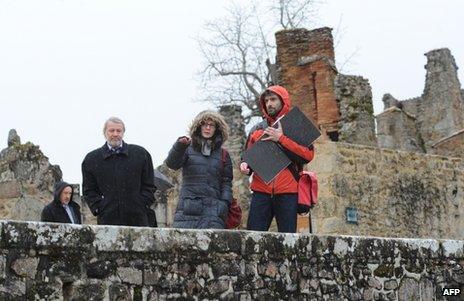Germany inquiry into Oradour wartime massacre in France
- Published

The ruins of the village have been preserved as a memorial
German investigators have opened a new inquiry into the wartime massacre of 642 people by SS troops in the central French village of Oradour-sur-Glane.
They acted on evidence uncovered in the archived files of East Germany's Stasi secret police about six soldiers, then aged 18 or 19, who are still alive.
East Germany refused to extradite the suspects for the original post-war trial of surviving SS men in France.
The ruins of the village are preserved just as they were after the massacre.
German investigators have travelled to Oradour-sur-Glane to investigate where different SS units were deployed and will hear from witnesses and survivors.
Some 60 soldiers were brought to trial the 1950s. Twenty of them were convicted but all were later released.
The German prosecutor says he hopes a new legal process will begin in Germany but with the suspects now 87 and 88 years old time is short, the BBC's Christian Fraser reports.
Women and children

On 10 June 1944, a detachment of SS troops surrounded the tiny hamlet in the Limousin region.
It is believed by some that they were seeking retribution for the kidnap of a German officer but some say that resistance members were based in a different, nearby village.
Most of the victims were women and children. Many of them were herded into a local church into which hand grenades were thrown before it was set on fire.
The men were locked in a barn. Machine-gunners shot at their legs, then doused them in petrol and set them alight.
Sixty-eight years on, one survivor, Robert Hebras, welcomed the new German inquiry but said it should have happened earlier.
"Lots of the people concerned are now old men like me, who may well have lost their memories. Nonetheless, it is good that Germany is taking responsibility for Oradour and remain concerned by it."
- Published22 January 2013